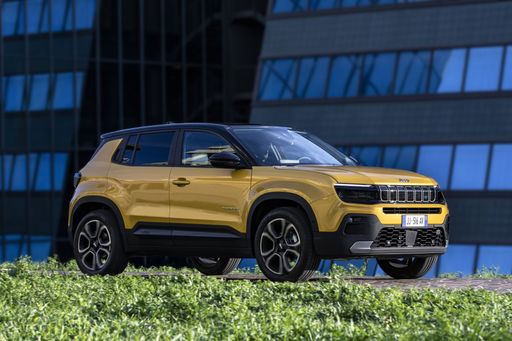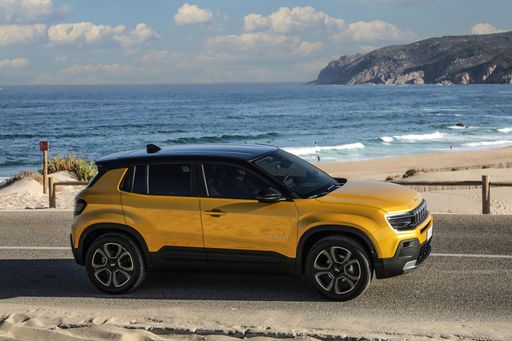Hyundai Bayon vs Jeep Avenger - Differences and prices compared
Compare performance (90 HP vs 156 HP), boot space and price (20100 £ vs 21900 £ ) at a glance. Find out which car is the better choice for you – Hyundai Bayon or Jeep Avenger?
Costs and Efficiency:
Price and efficiency are key factors when choosing a car – and this is often where the real differences emerge.
Hyundai Bayon has a minimal advantage in terms of price – it starts at 20100 £ , while the Jeep Avenger costs 21900 £ . That’s a price difference of around 1885 £.
Fuel consumption also shows a difference: Jeep Avenger manages with 4.90 L and is therefore slightly more efficient than the Hyundai Bayon with 5.80 L. The difference is about 0.90 L per 100 km.
Engine and Performance:
Power, torque and acceleration are the classic benchmarks for car enthusiasts – and here, some clear differences start to show.
When it comes to engine power, the Jeep Avenger has a decisively edge – offering 156 HP compared to 90 HP. That’s roughly 66 HP more horsepower.
In acceleration from 0 to 100 km/h, the Jeep Avenger is noticeable quicker – completing the sprint in 9 s, while the Hyundai Bayon takes 11.90 s. That’s about 2.90 s faster.
There’s also a difference in torque: Jeep Avenger pulls evident stronger with 260 Nm compared to 172 Nm. That’s about 88 Nm difference.
Space and Everyday Use:
Cabin size, boot volume and payload all play a role in everyday practicality. Here, comfort and flexibility make the difference.
Both vehicles offer seating for 5 people.
In curb weight, Hyundai Bayon is barely noticeable lighter – 1175 kg compared to 1180 kg. The difference is around 5 kg.
In terms of boot space, the Hyundai Bayon offers slight more room – 411 L compared to 380 L. That’s a difference of about 31 L.
When it comes to payload, Jeep Avenger hardly perceptible takes the win – 502 kg compared to 460 kg. That’s a difference of about 42 kg.
Who comes out on top?
Overall, the Jeep Avenger shows itself to be outperforms in nearly all aspects and secures the title of DriveDuel Champion.
It convinces with the more balanced overall package and proves to be the more versatile choice for everyday use.

Jeep Avenger
Costs and Consumption
View detailed analysis
Engine and Performance
View detailed analysis
Dimensions and Body
View detailed analysis
Hyundai Bayon
The Hyundai Bayon slips neatly between city runabout and small SUV, offering surprising practicality and a fresh, confident design that stands out in urban traffic. It's an easy buy for shoppers who want smart packaging, tidy handling and a dash of personality without fuss — a sensible little crossover that makes everyday driving a bit more enjoyable.
details




Jeep Avenger
The Jeep Avenger shrinks Jeep's boxy, adventurous styling into a city-friendly electric crossover that looks just as at home on tight streets as it does on muddy weekend lanes. It's a savvy pick for drivers who want go-anywhere attitude without the truck-size ego — practical inside, lively around town and ready to tackle a bit of rough stuff when the mood strikes.
details




Costs and Consumption |
|
|---|---|
|
Price
20100 - 25800 £
|
Price
21900 - 36900 £
|
|
Consumption L/100km
5.80 L
|
Consumption L/100km
4.9 - 5.7 L
|
|
Consumption kWh/100km
-
|
Consumption kWh/100km
15.50 kWh
|
|
Electric Range
-
|
Electric Range
400 km
|
|
Battery Capacity
-
|
Battery Capacity
51 kWh
|
|
co2
130 - 132 g/km
|
co2
0 - 129 g/km
|
|
Fuel tank capacity
-
|
Fuel tank capacity
44 L
|
Dimensions and Body |
|
|---|---|
|
Body Type
SUV
|
Body Type
SUV
|
|
Seats
5
|
Seats
5
|
|
Doors
-
|
Doors
5
|
|
Curb weight
1175 - 1200 kg
|
Curb weight
1180 - 1520 kg
|
|
Trunk capacity
411 L
|
Trunk capacity
325 - 380 L
|
|
Length
-
|
Length
4084 - 4088 mm
|
|
Width
1775 mm
|
Width
1776 mm
|
|
Height
-
|
Height
1527 - 1541 mm
|
|
Max trunk capacity
-
|
Max trunk capacity
1218 - 1277 L
|
|
Payload
450 - 460 kg
|
Payload
494 - 502 kg
|
Engine and Performance |
|
|---|---|
|
Engine Type
Petrol
|
Engine Type
Electric, Petrol, Petrol MHEV
|
|
Transmission
Manuel, Automatic
|
Transmission
Automatic, Manuel
|
|
Transmission Detail
Manual Gearbox, Dual-Clutch Automatic
|
Transmission Detail
Reduction Gearbox, Manual Gearbox, Dual-Clutch Automatic
|
|
Drive Type
Front-Wheel Drive
|
Drive Type
Front-Wheel Drive, All-Wheel Drive
|
|
Power HP
90 HP
|
Power HP
100 - 156 HP
|
|
Acceleration 0-100km/h
11.9 - 13.3 s
|
Acceleration 0-100km/h
9 - 10.6 s
|
|
Max Speed
-
|
Max Speed
150 - 194 km/h
|
|
Torque
172 Nm
|
Torque
205 - 260 Nm
|
|
Number of Cylinders
3
|
Number of Cylinders
3
|
|
Power kW
66 kW
|
Power kW
74 - 115 kW
|
|
Engine capacity
998 cm3
|
Engine capacity
1199 cm3
|
General |
|
|---|---|
|
Model Year
2025
|
Model Year
2023 - 2025
|
|
CO2 Efficiency Class
D
|
CO2 Efficiency Class
A, D, C
|
|
Brand
Hyundai
|
Brand
Jeep
|
What drivetrain options does the Hyundai Bayon have?
The Hyundai Bayon is available as Front-Wheel Drive.




